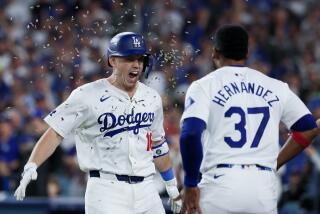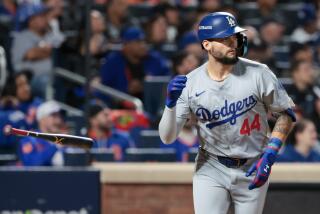NATIONAL LEAGUE CHAMPIONSHIP SERIES : JUST A SECOND : Mets Display an Uncharacteristic Flair for Errors in an Inning of Blunders
- Share via
Keith Hernandez stood in a corner of the New York Mets’ clubhouse, cheeks pale, sucking on his first cigarette as if it were his last.
“That wasn’t an inning,” the first baseman pronounced. “That was a nightmare.”
In another corner stood Frank Cashen, the Met general manager, resplendent in his trademark bow tie. Only at this moment, his face was blood red, as if that tie were choking him.
“All I could think during that inning was, ‘Is this happening to us? Is this really happening to us?’ ” Cashen said.
Yes, in the second inning in Wednesday night’s Game 7 of the National League championship series, it was really happening to them. The Mets will see it today on the television replays. Sometime this winter it may revisit them in the middle of the night.
The Dodgers score 5 runs on 4 hits, 2 Met physical errors and 1 Met mental error. After that, the Dodgers score no more but need no more as they win, 6-0, and go off giggling to the World Series.
Yes, it was really the Mets. In front of more witnesses than they’ll care to remember, the league’s meanest, smartest team tripped on its pride and kicked itself in the poise.
“It was an inning that took forever,” said Mookie Wilson, an outfielder watching from the bench. “And ever. And ever.”
Not quite. What the Mets had spent 7 months building up took all of 3 outs and about 20 minutes to break down. They needed just two blown throws and one bit of bonehead judgment.
“Seven months, gone like that ,” Hernandez said. “This is the most disappointed I’ve been in my career.”
Since his big-league career spans parts of 15 years, a second-inning dissection is in order:
Met pitcher Ron Darling arrives at the mound fresh from strikeouts of Mike Marshall and John Shelby that ended the first. Six pitches later, Mike Scioscia, a .166 career hitter off Darling, singles to right. Five pitches after that, Jeff Hamilton gets his first career hit off Darling, a line single to left, and Scioscia lumbers to second.
Next up, Alfredo Griffin. Even with pitcher Orel Hershiser batting behind him, a bunt is in order with no outs. The thinking is, if Griffin moves the runners to second and third, maybe Hershiser can hit a fly ball for a run.
So the Met dugout signals the defense to play for the bunt. And upon Darling’s first pitch, the defense does just that.
All except first baseman Hernandez. He thought he knew better. While Darling charged off the mound toward third, and second baseman Wally Backman raced over to cover first, Hernandez just stood there near first.
“I was reluctant to charge the plate with the pitcher up next,” Hernandez said. “I didn’t think he would be bunting.”
He thought wrong. Not only did Griffin bunt, he bunted horribly, popping it up on the right side, where it would have dropped right into Hernandez’s glove, had he been charging. But nobody was there, the bunt dropped, and bases were loaded.
“I’m charging, I’ve got it easily, but I was too deep,” Hernandez said. “I’ve just got to be smart enough to know that in a game like this, they would play for every run.”
Hernandez was asked how long he thought about his blunder.
“Oh, for about 4 runs,” he said.
With the bases loaded, up steps Hershiser. He immediately falls behind, 1-and-2, and on the next pitch just throws his bat at the ball, hoping to avoid a strikeout. He does worse. He taps it weakly to third baseman Gregg Jefferies.
“We have a home-to-first double play,” Hernandez recalled.
Wrong again. Trying too hard to make a quick grab, Jefferies closes his glove before the ball arrives. He fumbles around, picks up the ball bare-handed, realizes it is too late to go home, and throws to first base. The throw is understandably late. One run scores.
Added to his two failed sacrifice bunts in Game 4, and his running into a grounder on the basepath in Game 5, Wednesday’s maneuver capped a rather educational series for the 21-year-old phenom.
“I wanted to get Ronnie out of that mess so bad, that’s all I could think about, that I tried to do everything too fast, I rushed it all,” Jefferies said. “I should have planted myself and my glove, but I hurried it.”
His biggest mistake was in worrying about Ronnie. By then, Darling had stopped even worrying about himself.
“Harry Houdini couldn’t have gotten out of that jam,” Darling said.
Especially if Houdini followed the error by falling behind, 2-and-1, to Steve Sax, and was forced to throw a ball right down the middle, which Sax drilled for a 2-run single.
At that point Darling had faced five batters and retired none, three runs were in and runners were on first and second. Just the spot for Dwight Gooden’s first relief appearance since high school.
“I get in and it’s like, weird,” Gooden said. “Unreal. Unbelievable.”
And he was just getting to the good part.
Gooden gets a groundout from Mickey Hatcher, moving the runners to second and third. He then intentionally walks Kirk Gibson, loading the bases for double-play threat Mike Marshall.
Silly him. Marshall hits a double-play grounder, all right, but Gooden’s teammates can’t even turn one.
The ball rolls into Backman’s glove. Backman turns to flip it to shortstop Kevin Elster and--whoops--the ball sails. Elster can only jump and knock it down. Another run scores. Bases still loaded.
“The field is kept moist here, and I just slipped,” Backman said. “I lost my footing, and there went the ball.”
Backman said that a couple of innings later, while he was standing on second base, Sax told him that he still believed the Mets were the best team in the league. Backman said this time, for once, he had trouble buying it.
“Right now, my mind is a blank,” Backman said. “I can’t see us playing like we played. I just can’t see it.”
After Backman’s error, John Shelby hit a fly to deep center to score another run. An intentional walk to Scioscia later, and Jeff Hamilton struck out looking to end the inning.
So much for nightmares. Now, for the Mets, comes the hard part.
“We blew it ourselves, we beat ourselves,” outfielder Darryl Strawberry said. “Now we have to live with it.”
More to Read
Are you a true-blue fan?
Get our Dodgers Dugout newsletter for insights, news and much more.
You may occasionally receive promotional content from the Los Angeles Times.











